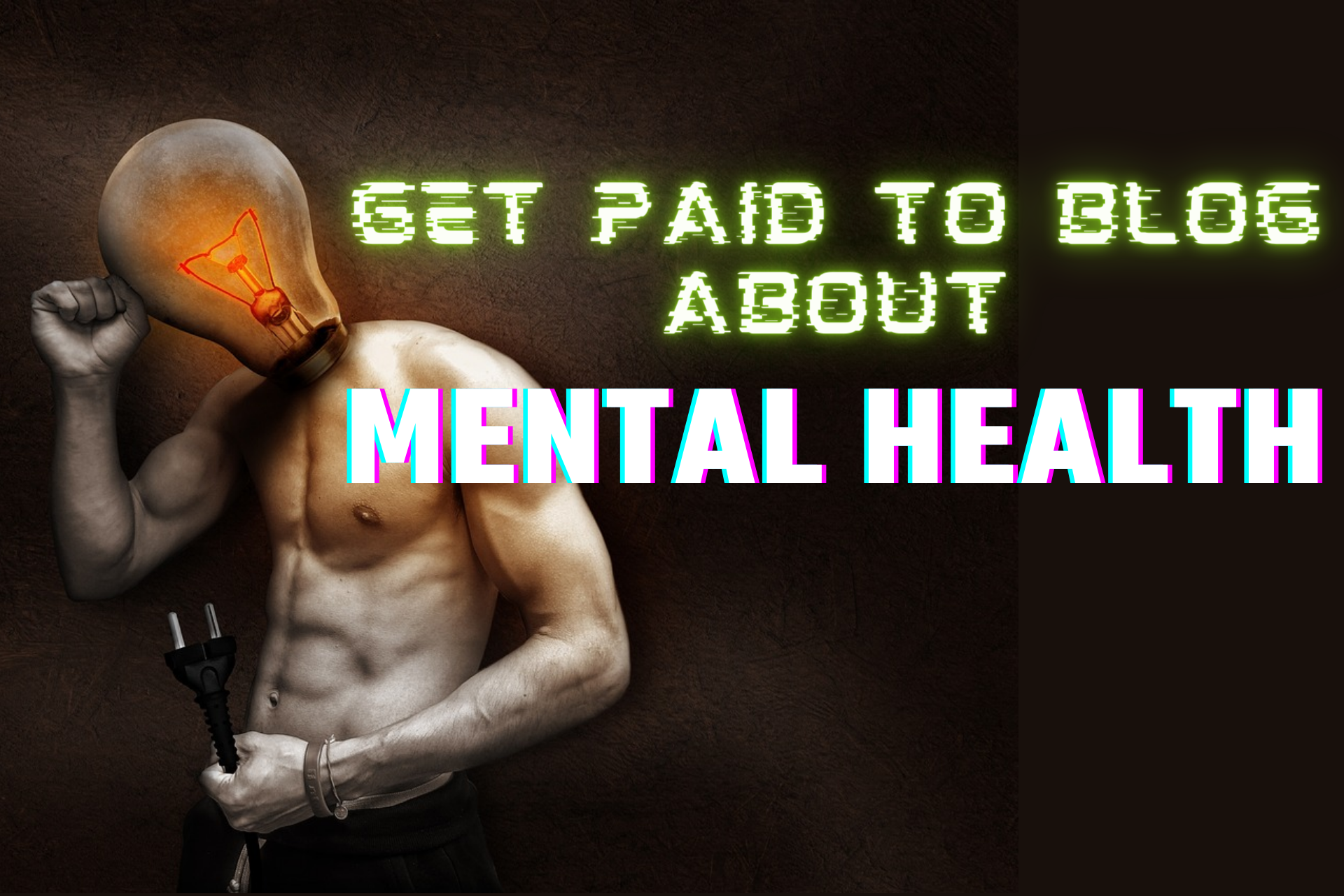In recent years, the digital landscape has transformed the way we share and consume information. Blogging, once a hobby or creative outlet, has now emerged as a lucrative avenue for earning income, especially in niche markets like mental health. If you’re passionate about mental health and want to turn your expertise and experiences into a source of income, you’ve come to the right place. In this definitive guide, we’ll explore various strategies and opportunities to help you Get Paid to Blog About Mental Health while making a meaningful impact on individuals seeking support and understanding.
Table of Contents
ToggleUnlocking Earning Potential in Mental Health Blogging
Before delving into the specifics of monetization, it’s crucial to establish your authority and credibility within the mental health niche if you want to Get Paid to Blog About Mental Health. Building a solid foundation for your blog entails creating valuable, informative, and empathetic content. Share your personal experiences, expert insights, and research-backed information to connect with your audience authentically. Establish trust, and you’ll be better positioned to explore income-generating avenues.
Monetization Strategies for Mental Health Bloggers
1. Affiliate Marketing
Incorporating affiliate links to products or services related to mental health can be a steady source of income. Recommend resources you genuinely believe in, such as therapy apps, self-help books, or online courses. Receive commissions for every sale generated through your referral.
2. Sponsored Content
As your blog gains traction, consider collaborating with mental health brands or organizations. They may pay you to write sponsored posts, reviews, or host webinars on their behalf. Ensure that the partnerships align with your blog’s values and mission.
3. E-books and Online Courses
Compile your expertise into e-books or create comprehensive online courses. These digital products can be sold directly through your blog. They not only provide value to your readers but also generate passive income over time.
4. Membership Sites
Offer premium content or a community space for subscribers. Building a loyal community willing to pay for exclusive access to your insights can be a sustainable way to generate income.
5. Freelance Writing
Leverage your mental health blogging experience to secure paid writing gigs for other platforms, magazines, or websites. Many publications are actively seeking expert contributors in the field.
Get Paid to Blog About Mental Health: Navigating the Challenges
While the prospect of Earning from Mental Health Blogging is exciting, it comes with its share of challenges. Mental health is a sensitive topic, and ethical considerations should always be at the forefront. Be mindful of the content you create and ensure that it promotes well-being, empathy, and positive change.
Additionally, the digital landscape is ever-evolving, so staying updated with SEO techniques, social media trends, and online marketing strategies is crucial. Maintaining consistency is crucial, as crafting a prosperous blog demands dedication and time investment. Patience and persistence will ultimately determine your success.
Exploring Blogging Opportunities in the Mental Health Niche
The mental health niche offers a wealth of opportunities for those seeking to Monetize Mental Health Blog content. One avenue worth exploring is online counseling or coaching services. If you possess the necessary qualifications, you can offer your services to individuals seeking professional guidance through your blog. This not only provides a valuable resource to your readers but also generates income as clients book sessions with you.
Another avenue within the niche is public speaking and workshops. Once your blog gains a substantial following, you may be invited to speak at mental health conferences or conduct workshops. These events often come with speaker fees and can significantly boost your income while increasing your visibility as an expert in the field.
Building a Brand as a Mental Health Blogger
To maximize your earnings in the realm of Get Paid to Blog About Mental Health, it’s essential to build a strong personal brand. Consistency in your messaging, visual identity, and voice will help you stand out. Engage with your audience through social media, webinars, or podcasts to foster a loyal community around your blog.
Additionally, don’t underestimate the power of networking. Connect with other mental health professionals, bloggers, and influencers in the field. Collaborations and joint ventures can expand your reach and open up new income streams, such as co-hosting webinars or launching joint products.
The Role of SEO and Content Strategy
In the competitive world of blogging, understanding the nuances of SEO (Search Engine Optimization) is vital. By optimizing your content for relevant keywords like “Mental Health Blogger Payments” and “Mental Health Writing Jobs,” you can improve your blog’s visibility on search engines. This increased visibility can lead to higher traffic, more opportunities for monetization, and ultimately, greater income potential.
Additionally, investing in a well-thought-out content strategy is crucial. Plan your blog posts, social media updates, and email newsletters strategically. Consistently providing valuable content not only keeps your audience engaged but also attracts advertisers and sponsors looking to partner with influential mental health bloggers.
Ethical Considerations in Mental Health Blogging
As you embark on your journey to Get Paid to Blog About Mental Health, it’s essential to be mindful of ethical considerations. Always prioritize the well-being and privacy of your readers. Avoid promoting harmful products or services that could negatively impact mental health. Be transparent about your affiliations and sponsorships to maintain trust with your audience.
Furthermore, consider including disclaimers and resources for individuals who may need professional help. Mental health blogging carries a responsibility to provide accurate information while fostering a safe and supportive community.
Diversifying Your Income Streams as a Mental Health Blogger
In the quest to Monetize Mental Health Blog, diversifying your income streams can provide financial stability. Consider creating digital products like printable mental health worksheets, guided meditations, or even personalized coaching packages. These offerings can cater to a broader audience and generate income even while you sleep.
Furthermore, exploring various affiliate programs related to mental health can boost your earnings. Look for partnerships with mental health apps, therapy platforms, or wellness subscription services. As you strategically incorporate these affiliate links into your content, you can gradually accumulate a passive income stream.
Leveraging Social Media and Email Marketing
Your blog is just one aspect of your online presence. To maximize income from Blogging Opportunities in Mental Health, utilize social media platforms to engage with your audience. Share valuable snippets of your content, host Q&A sessions, and build a sense of community. As your social media following grows, you may also attract sponsored post opportunities or affiliate marketing collaborations.
Don’t underestimate the power of email marketing when you’re looking to Get Paid to Blog About Mental Health. Encourage blog visitors to subscribe to your newsletter by offering exclusive content or resources. Once you’ve built a substantial email list, you can promote your digital products, online courses, or affiliate offers directly to a highly engaged audience. This direct line of communication can significantly impact your income within the mental health niche.
Tracking and Optimizing Your Income
To ensure sustainable income from your mental health blog, it’s crucial to monitor your earnings and assess the performance of your monetization strategies. Use analytics tools to track which income streams are generating the most revenue. This data can guide your future content creation and promotional efforts, helping you maximize your income potential.
Furthermore, it’s essential to remain informed about industry trends and emerging opportunities. New mental health apps, therapies, or wellness products constantly enter the market. Keeping an eye on these developments can lead to timely partnerships and income-boosting collaborations.
Navigating the Challenges
While the financial rewards of Turning Mental Health Blogging into Profit are enticing, there are challenges to be aware of. Balancing commercial interests with your blog’s mission to support mental well-being can be delicate. Always prioritize the ethical promotion of mental health resources and avoid sensationalizing or stigmatizing mental health issues for profit.
Furthermore, income from blogging can be irregular, especially when you’re starting. Be prepared for fluctuations in earnings and have a financial plan in place to sustain you during lean periods.
Managing Your Mental Health as a Blogger
Amidst the pursuit of “Get Paid to Blog About Mental Health”, it’s crucial to prioritize your own mental well-being. Blogging can be demanding, with deadlines, engagement responsibilities, and sometimes, emotionally taxing content. Create a self-care routine that includes breaks, exercise, and time for relaxation. Your own mental health is not only valuable in its own right but also essential for producing quality content and maintaining the longevity of your blog.
Legal Considerations and Financial Management
Understanding the legal aspects of blogging is often overlooked but important. Ensure you comply with relevant laws and regulations, such as disclosing affiliate relationships, handling user data responsibly, and paying taxes on your blogging income. Consider consulting with a legal professional or accountant who specializes in online entrepreneurship to navigate these aspects smoothly.
As your income grows, it’s wise to manage your finances wisely. Create a dedicated business bank account, track your expenses, and set aside money for taxes. Financial stability is key to sustaining your blogging career in the long run.
Scaling Your Mental Health Blogging Business
Once you’ve established a steady income from your blog “Get Paid to Blog About Mental Health”, explore opportunities to scale your business further. Consider hiring freelance writers or editors to help create and manage content. This frees up your time to focus on strategic growth and income diversification. Additionally, you might invest in marketing or advertising to expand your reach and attract a larger audience.
Engaging with Your Audience
Engagement with your audience goes beyond content creation. Responding to comments, emails, and messages promptly can foster a strong sense of community and loyalty among your readers. This engaged community can be instrumental in “Get Paid to Blog About Mental Health”, as they’re more likely to support your endeavors, purchase your products, and recommend your blog to others.
Continuous Learning and Adaptation
The digital landscape undergoes rapid evolution, meaning that strategies effective today may not be as effective tomorrow. Stay committed to continuous learning and adaptation. Attend webinars, read industry publications, and participate in online communities of bloggers to stay informed about the latest trends, tools, and strategies in the field. Being adaptable and open to change is key to maintaining and increasing your income over time.
Creating a Sustainable Income Stream
A critical aspect of “Get Paid to Blog About Mental Health” is establishing a reliable and sustainable income stream. While blogging offers various monetization options, such as affiliate marketing and sponsored content, it’s essential to plan for the long term. Consider diversifying your income sources to mitigate risks. For instance, if affiliate sales decline, your digital products or coaching services can help maintain a stable income.
Understanding SEO for Maximum Exposure
To optimize your income from mental health blogging, a deep understanding of SEO is indispensable. Conduct thorough keyword research to identify search terms related to your niche, like “Mental Health Blogger Payments” or “Mental Health Writing Jobs.” Incorporate these keywords strategically into your content, titles, and meta descriptions. By ranking higher on search engine results pages, you’ll attract more organic traffic and potential income opportunities.
The Power of Networking and Collaboration
Collaboration is a valuable tool in the arsenal of a Get Paid to Blog About Mental Health blogger. Forge relationships with fellow bloggers, mental health professionals, and industry influencers. Collaborative projects, such as co-authored e-books or joint webinars, can introduce your blog to new audiences and generate additional income through shared ventures. Networking also opens doors to potential speaking engagements and conference appearances.
Managing Your Time Effectively
Efficient time management is crucial when balancing income generation with content creation. Establish a content calendar, set realistic deadlines, and allocate time for promotion and engagement. Consider using productivity tools and techniques to streamline your workflow, allowing you to optimize your time and energy for both income-related activities and quality content production.
Exploring Membership Models
As your Get Paid to Blog About Mental Health blog gains popularity, introducing a membership model can be a strategic move. Offer premium content, exclusive webinars, or one-on-one consultations to subscribers in exchange for a monthly fee. Membership models not only provide a steady income but also cultivate a loyal community willing to support your mission and content financially.
Giving Back to the Community
While focusing on income generation is essential, don’t lose sight of your core mission: advocating for mental health awareness and support. Consider allocating a portion of your earnings to charitable donations or mental health organizations. Demonstrating your commitment to the cause can strengthen your blog’s credibility and attract like-minded readers and sponsors who align with your values.
The Role of Email Marketing in Monetization
Email marketing is an often underestimated but highly effective tool for increasing your income as a Get Paid to Blog About Mental Health blogger. By building a subscriber list, you create a direct line of communication with your most engaged audience. Regularly sending out newsletters containing valuable content, product promotions, and affiliate offers can significantly boost your income. Craft engaging and personalized email campaigns to encourage conversions and foster a stronger connection with your readers.
Investing in Quality Design and User Experience
When it comes to Get Paid to Blog About Mental Health, first impressions matter in the online world. Investing in professional design for your blog can enhance your credibility and user experience, ultimately driving more income. A well-designed website is more likely to attract sponsors, advertisers, and partnerships. Moreover, a user-friendly interface increases the likelihood of visitors staying longer, engaging with your content, and exploring your income-generating offerings.
Utilizing Analytics and A/B Testing
Data-driven decisions are essential for optimizing your income strategies as a Get Paid to Blog About Mental Health blogger. Implement analytics tools to track user behavior, conversion rates, and traffic sources. A/B testing different elements of your blog, such as headlines, call-to-action buttons, and content formats, can provide insights into what resonates most with your audience. By making data-driven adjustments, you can continually refine your approach to maximize income.
Building a Sales Funnel
In the realm of Get Paid to Blog About Mental Health, a well-constructed sales funnel can guide your readers from casual visitors to paying customers. Start by offering valuable free content, such as informative blog posts or downloadable resources, to attract and engage your audience. Gradually introduce low-cost offerings like e-books or online courses. As trust and loyalty grow, your audience will be more inclined to invest in higher-priced products or services, ultimately increasing your income potential.
Staying Committed to Quality Content
In the pursuit of income as a Get Paid to Blog About Mental Health blogger, never compromise on the quality and authenticity of your content. Exceptional content forms the bedrock of a thriving blog. Maintain a consistent posting schedule, conduct thorough research, and ensure that your content genuinely addresses the needs and concerns of your audience. Valuable content not only attracts readers but also keeps them coming back and can serve as a reliable income generator.
Long-Term Strategies for Sustainable Income
While it’s essential to explore immediate income opportunities in the context of Get Paid to Blog About Mental Health, it’s equally vital to plan for the long term. Consider creating evergreen content that remains relevant and valuable over time. Evergreen content can continue to attract new readers and generate income for years to come. Additionally, focus on building a strong brand and community around your blog. A loyal audience can provide consistent support through product sales, memberships, and donations, ensuring the sustainability of your income.
Adapting to Changing Trends and Technologies
The digital terrain continually shifts, with fresh platforms and technologies emerging frequently. Stay vigilant about upcoming trends and adapt your strategies accordingly, especially in the context of Get Paid to Blog About Mental Health. For example, consider the rise of video content and podcasts in the mental health niche. Exploring these mediums can open up new income avenues through advertising, sponsorships, and paid partnerships. By staying nimble and open to change, you can not only increase your income but also maintain your relevance in the ever-changing world of online content creation.
Conclusion: Turning Mental Health Blogging into Profit
In conclusion, Get Paid to Blog About Mental Health is not just a possibility; it’s a viable reality for those passionate about the field. By providing valuable, authentic content and exploring various monetization strategies, you can both support your financial goals and contribute to the mental well-being of your audience. Remember, your journey as a mental health blogger is a marathon, not a sprint. Stay true to your mission, and your income will follow suit, allowing you to make a meaningful impact in the world of mental health blogging.









